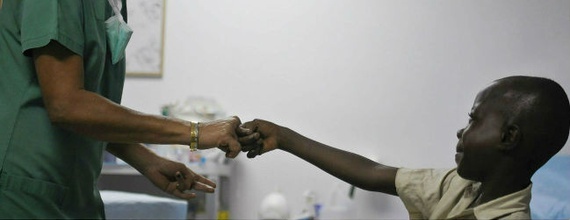Many developed world academic institutions are forming international partnerships to improve clinical care, education and research in developing countries. This is a great development, and one I hope will last even when it is no longer trendy. But, particularly the conduct of research in developing world countries brings with it ethical complexities: it's cross-cultural, there are power gradients, and sometimes researchers are motivated more by pecuniary gain than true altruism. To help manage these risks, so our outreach can be most effective and least undermined by such factors, I wrote a review of the history and approach to the ethics of research in low and middle income countries.
HIV doesn't happen here
The rural state of New Hampshire has some of the lowest HIV incidence and prevalence rates in the United States. That's great news, but it comes with a price.
Many at risk people in New Hampshire think HIV is a third world or city problem and not something they need to worry about personally. That means they are less likely to take precautions against HIV.
At the same time, people who have been diagnosed with HIV in New Hampshire face stigma from neighbors and friends who may be less familiar with HIV than people living in urban areas where the disease is more prevalent. Geography adds to those challenges: the ~650 people cared for at Dartmouth-Hitchcock HIV Program come from a much wider geographic area than patients in similarly sized clinics in metropolitan areas. That translates to longer travel times and more complicated access to care.
Not surprisingly, HIV patients living in rural areas have been shown by Sam Bozzette and others to receive substandard care, probably because HIV experts are not sufficiently accessible.
In formal analyses at the Dartmouth-Hitchcock HIV Program, our HIV expert providers delivered outstanding care equivalently to rural and urban patients But despite this my colleagues and I showed that our rural patients have higher rates of depression and even higher mortality. New Hampshire might be a lovely place to live, but living with HIV infection anywhere is no walk in the park.
Todd Bookman of NHPR touches on these and other issues in nice radio story in which I was quoted. There are still plenty of battles remaining in the war against HIV in New Hampshire.
Glad to Add a Modest Contribution to "The Fist Bump Manifesto"
How should we protect patients from infections in our hospitals? Although hand washing is the most important intervention, James Hamblin of The Atlantic wrote a great article about the use of the fist bump to prevent infections. I was honored to be interviewed and to contribute some thoughts about hygiene and hipness.
Check out the article at The Atlantic.
HIV and the Global Sex Tally
Every year 2.5 million people are newly infected with HIV. This figure is simultaneously catastrophic and hard to understand, but the silver lining in that viral cloud is that we can use it to calculate how much sex people are having.
To find out how, read my full article at the Scientific American.
Should we police HIV transmission?
At gay bathhouses in the Bay Area, monitors pop in on the “playroom” irregularly—“every 20 minutes, every 40 minutes, every hour,” one manager says, trying to make sure patrons are having sex safely.
“You put the condom on or get the hell out,” a monitor at one such club said, upon discovering a couple violating the rules.
William Woods and his colleagues talked to these bathhouse monitors, as well as managers and patrons, about their safer sex monitoring programs, detailed in a recent article in the academic journal Sexuality Research and Social Policy. Some bathhouses enacted aggressive monitoring because “they sincerely care about their patrons’ health,” Woods said. These bathhouses in the Bay Area often were “at the table when the guidelines that are in place were developed, so they have a personal stake in them.” In other cities bathhouses were under threat of closure from state health departments, and their monitoring programs, some implemented so the clubs could remain open, were only lackadaisically enforced.
The attempted policing of HIV transmission has been in the news a lot lately.
To continue reading, see my full article at The Atlantic. It was republished at KevinMD as well.
All that training goes to good use
I was honored to be interviewed for this great article on Jezebel by Erin Gloria Ryan about the infectious diseases Miley Cyrus could contract via her apparent predilection for licking things.
Medicine is hard work. It takes years of training. Sleep deprivation and sacrifice are part of the package. But sometimes it all adds up and feels worthwhile. Success.
If you were exposed, would you want to know?
This past week we learned that 15 patients in New England were exposed to a rare infection called Creutzfeldt-Jakob disease (CJD) when neurosurgical instruments contaminated with the infection were used in their care. Each had undergone a brain or spinal surgery in early 2013, and now their future was uncertain.
Creutzfeldt-Jakob disease takes years to develop. Patients exposed to the infection feel fine for years but then they become moodier and forgetful and over the course of months subtle cognitive defects progress to severe dementia. Patients with CJD forget the names and faces of loved ones, they lose the ability to walk, speak, or swallow, and they lapse into a coma that has proven fatal one hundred percent of the time.
When Creutzfeldt-Jakob disease contamination of surgical instruments is discovered, doctors at Catholic Medical Center and other hospitals wonder if it is right to tell patients. In most cases the disease will never occur and there is no effective means of prevention. Even for the unlucky patients who do develop the disease – if any of them do – there is no effective therapy so advance warning gives no extra measure of hope. Worse still, there is no diagnostic test to predict who will escape infection or die, so the only thing patients can do once notified is wait. That means the only real world impact of disclosure, regardless of the eventual outcome, is patient distress. So in this case is knowledge power, or is knowledge just knowledge?
Continue reading my full article at TheAtlantic Health. It was republished at medpageTODAY's KevinMD.com.
Doctorstories.org
Medicine is going through tough times. The trusted family doctor who makes house calls has been replaced in the public lore by the benign technician but most recognize we need better models. Public narrative seems like a great way forward. Phil Lederer (@philiplederer) runs a nice website called DoctorStories.org in which he showcases life stories from doctors and other healthcare providers.
The Campfire by Winslow Homer
What brought people to medicine in the first place? Why do they stay? What was their greatest contribution? Read my contribution and others at doctorstories.org, and tell your own story too.
The Dignity of a Porn Star: What Was Lacking in Our Response to Cameron Bay
Porn stars all across Fresno were told to put their clothes back on and go home a couple of weeks ago on the news that a 29 year-old adult actress named Cameron Bay tested positive for HIV.
The Internet lit up. News, judgments, and jokes shot left and right in newsrooms as freely as bodily fluids fly on set.
Something important is lacking though: concern for Ms. Bay. This young woman just learned that she has an incurable and potentially lethal disease. Our first emotion, I think, should be concern. We should commiserate. We should be grateful for our health and hopeful for hers.
I learned this from Jose*, a patient in my HIV clinic. Jose was a muscular guy who wore tight black shirts and a jet-black goatee. The list of movies in which Jose engaged in unprotected anal sex was long. Very long. None of the titles can be repeated here so let’s just say somebody is making good money dreaming up new variations on the Bareback Mountain theme.
Read the full article at Scientific American guest blogs. It was also republished at The Health Care Blog.
NHPR Panel Discussion about Advanced Directives and End-of-Life Planning
It was a thrill to join Laura Knoy of NHPR's "The Exchange" and other guests Todd Bookman (NHPR science reporter), Shawn LaFrance (executive director of the Foundation for Healthy Communities) and Michael Skibbie (Policy Director for the Disabilities Rights Center) for a panel discussion about advanced directives, death panels, end-of-life planning and New Hampshire's inadequate surrogate decision-maker laws. Our gracious host said we were "flooded" with calls - including from NH state senator Peggy Gilmore.

![[ M U R M U R S ]](http://images.squarespace-cdn.com/content/v1/51efa33ce4b09afa04cb2a66/1376911411704-LDY4UEIH1WRGPUXTMLJU/Logo.jpg?format=1500w)










